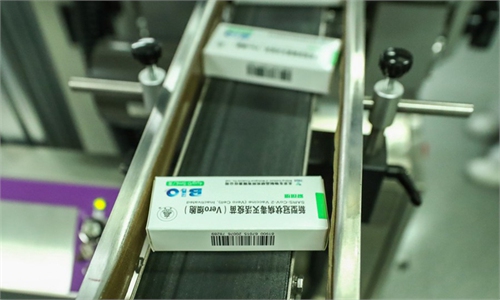China’s economy, industry to benefit from corporate tax cut, especially of SMEs: analysts

Staff members of tax service help a financial staff of a company (R) to print out a list of her company's tax cuts and fee reductions in Fuzhou, capital of southeast China's Fujian Province, Aug. 21, 2019. An online service of clearly listing the cut of taxes and fees has been promoted in the whole province of Fujian after sucessfully piloted in the city of Fuzhou.Photo:Xinhua
While some enterprises said that they have reduced costs from China's tax and fee reduction policies and survived last year amid COVID-19, some small and medium-sized enterprises (SMEs) find it difficult to benefit from preferential policies.
More preferential policies have been released to further reduce the tax burden on enterprises, especially on SMEs. For example, the monthly threshold of value-added tax (VAT) for small-scale taxpayers will be raised from sales of 100,000 yuan ($15,250) to 150,000 yuan, said the Ministry of Finance on Wednesday at a press conference.
"The tax reduction policy has helped our company save about 30 million yuan last year during the outbreak of the epidemic, roughly equivalent to 50 percent of the operating costs," Chen Chunxing, vice president of Hubei Federation of Industry and Commerce and the Chairman of Wuhan Intelligence Elevator Company in Central China's Hubei Province, told the Global Times on Friday.
Chen said that measures by the government, including cutting interest rates on bank loans, have helped businesses weather the storm. One year later, enterprises in Hubei have recovered to the level before the epidemic.
The temporary and urgent tax and fee reduction policies introduced last year to help firms will be phased out in an orderly manner, including exemption of employees' social insurance and endowment insurance, as well as reduction of the rate of VAT from 3 percent to 1 percent, the Ministry of Finance announced on Wednesday.
"Now is the time to roll back the tax cuts without adding burden to the country," Chen said. SMEs in the Hubei were exempted from VAT in 2020 and enjoyed preferential electricity prices.
Fujian Kesida Food Company, whose registered capital was 3 million yuan, received 620,000 yuan in tax cuts last year. "It only took three working days from the receipt of materials to the issuance of tax rebates, which quickly increased the company's liquidity," media reported, citing the head of the company.
But some SMEs see it differently. "To be honest, the tax refunds under these policies are too small for our business. It is not worth the human cost to complete the complicated procedures," a director of a Wuhan-based medium-sized chip design company, told the Global Times on Friday on condition of anonymity.
China has been committed to reducing taxes and fees to reduce the burden on enterprises in recent years. From 2016 to 2020, reduction on taxes and fees totaled more than 7.6 trillion yuan. Taxes and fees have been cut by more than 2.5 trillion yuan in 2020, State Taxation Administration data shows.
It is even more important to keep SMEs less burdened from taxes as they are the pillar of the national economy and the mainstays of industries, said analysts.
"SMEs, which account for 90 percent of the total number of enterprises, contribute about 80 percent to employment, 70 percent to technological innovation, 60 percent to the GDP, and 50 percent to the tax revenue in China," Zhang Xiaorong, director of the Cutting-Edge Technology Research Institute, told the Global Times on Friday.
Wang Peng, an associate professor at the Gaoling School of Artificial Intelligence at Renmin University of China, said that for example, sci-tech SMEs are the main force of industrial innovation in the future. A large number of internet companies, high-tech enterprises, including unicorns, grew up from SMEs.
"If the SMEs can enjoy the tax and fee reduction policy, there will be huge dividend on China's economy and industry development," Wang told the Global Times on Friday.
China's high-tech enterprises are now in the industrial growth stage, and most of them are SMEs, which account for a small proportion of GDP, but they are the pillar of the future economy, Zhang noted.

